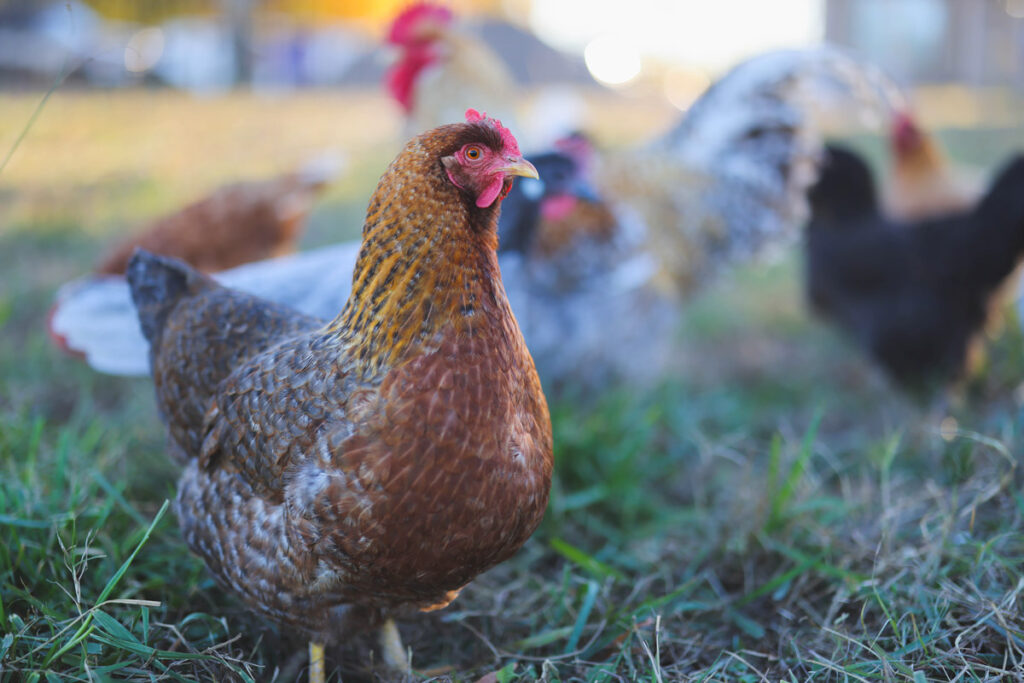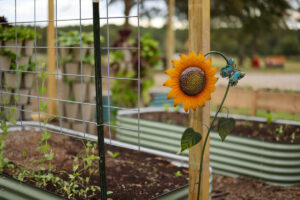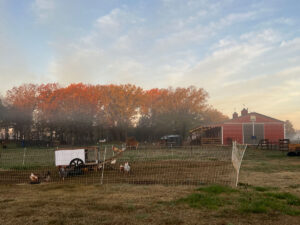Today I’m going to be taking a deep dive into raising backyard egg-laying chickens. I know this is a pretty introductory topic, however, I have heard so many new people entering into this homesteading lifestyle lately and backyard chickens is their entry point. I want to make sure it's covered well.
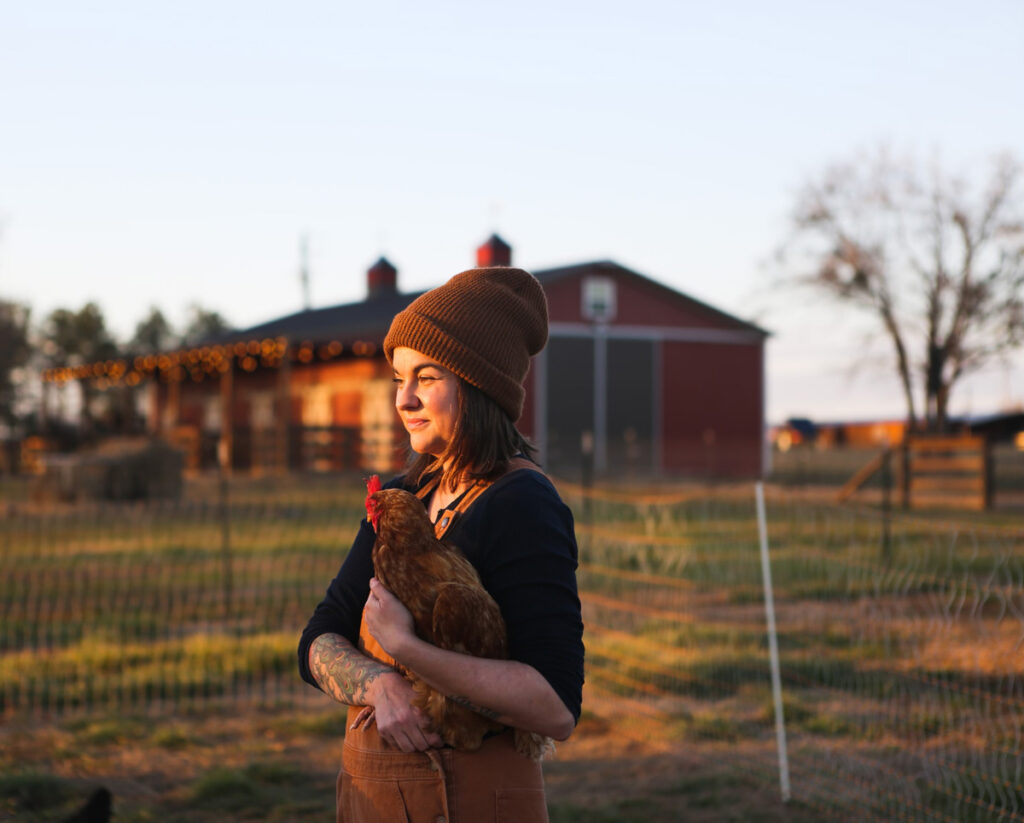
As you know, my love of homesteading started at a very young age, and I did a lot of research before I even began my actual adventures. Egg-laying chickens were something I read up on a lot, and truth be told, the information I read made starting seem daunting.
It’s my desire to share my experiences and make this lifestyle very approachable to those just entering in. So sit back and enjoy this podcast as I chat all about raising chickens.
If you're not quite ready to jump in, this post on the best chicken breed for you may be helpful. Remember, just because I raise certain breeds doesn't mean they'll do well for you, your climate, your specific limitations, etc. That post should shed some light on the best chicken breeds and why.
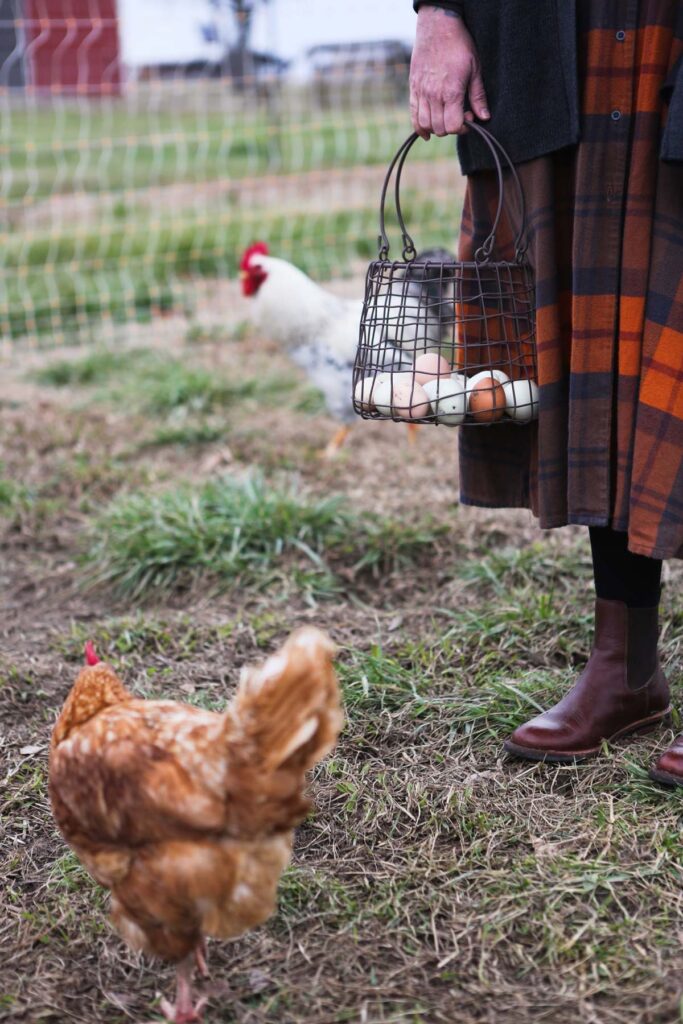
Why Raise Egg-Laying Chickens?
There are so many reasons to raise your own egg-laying chickens.
- Being able to provide food for your family that you know exactly where it came from and how the chickens were treated is an incredible feeling.
- Reducing your reliance on the grocery store is the first step to food freedom.
- The price of eggs is increasing at the grocery store. If you do it right, you can offset your groceries a bit by raising your own.
- If you're looking for an income source, you could raise the chickens to sell their eggs.
- I've even heard murmurings of hatcheries running out of chicks, so if you really wanted to dive deep you could get yourself a rooster and start hatching out chicks to sell (or raise them up as pullets and sell them for even more).
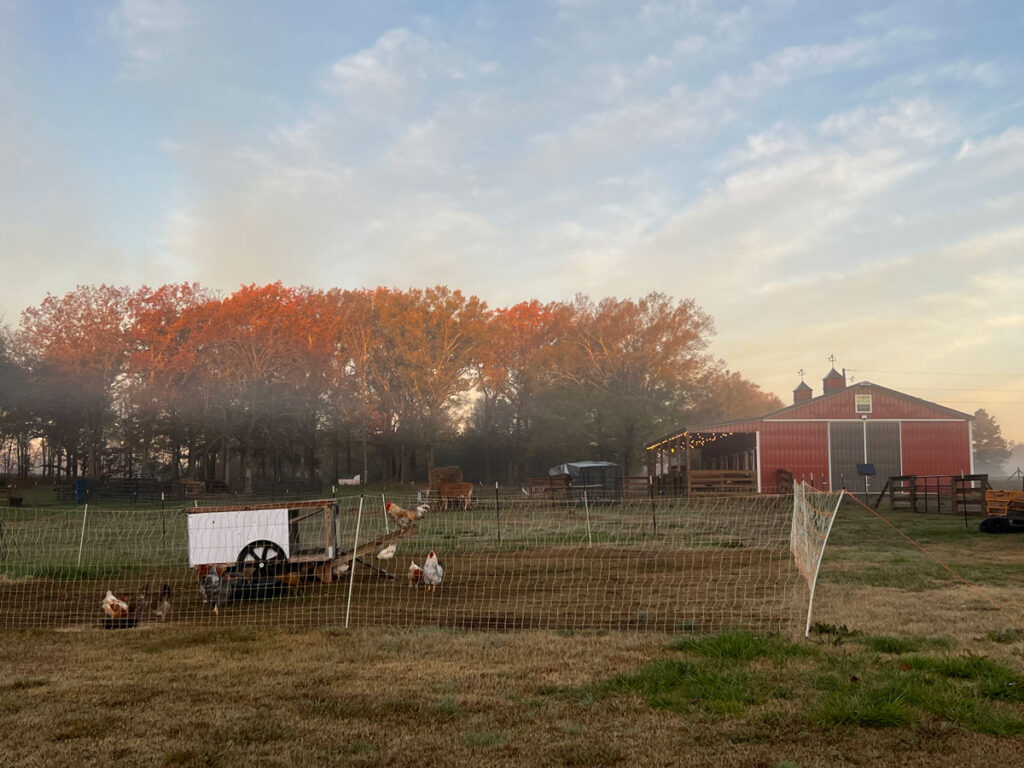
Be Prepared (Chicken Math is Real)
Y'all, chicken math is real. We all start off getting just a few hens (or chicks) to raise up for eggs, but before you know it, it's gripped you and you're swimming in chickens.
Being prepared ahead of time to keep chickens will set you up with the right foot forward. When you're prepared, there's less chance of overwhelm and less chance of failure.
Be sure to listen to the podcast episode that Miah and I did together on the Mistakes We Made to hear about my experience of buying chicks on FB Marketplace (and why I highly caution this now!).
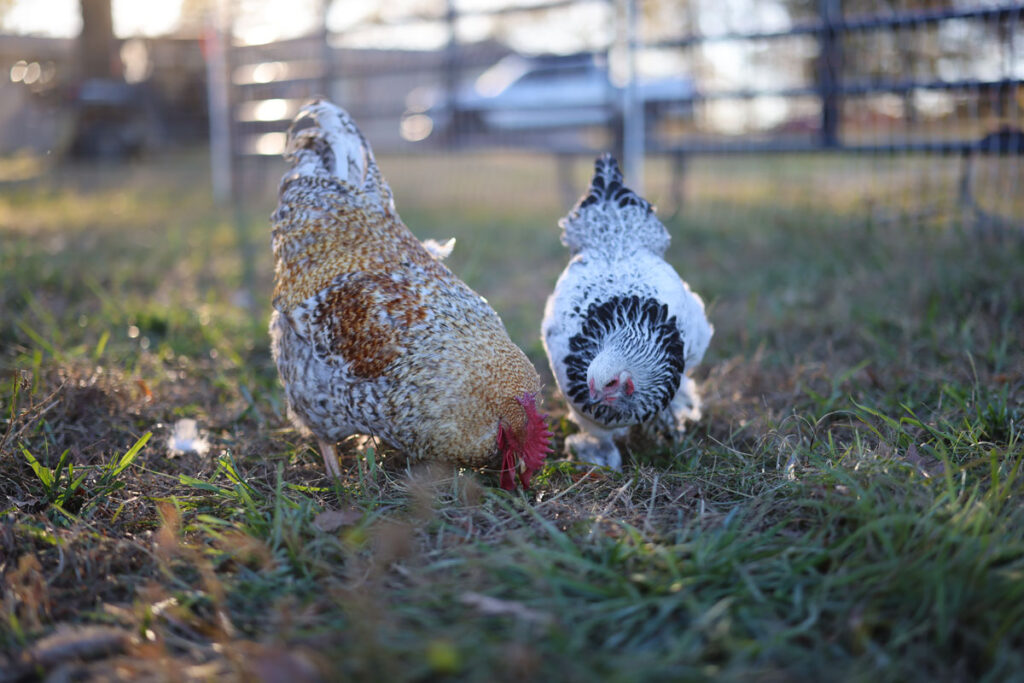
Biosecurity – Why It's Important
If you're sourcing chicks, pullets or mature hens from someone other than a reputable source, be sure to do your research.
One year we had a respiratory virus come through our flock because I was sourcing chickens from others farmers and failed to quarantine the new hens before introducing them into the flock.
Sadly, we had to cull the whole flock and it was a massive setback for our farm. I say all this to caution you to be careful with biosecurity and always know you're sourcing from trusted places.
Chances are for a backyard home flock you won't have to deal with this. But it's still wise to have an awareness and to take precautionary measures.
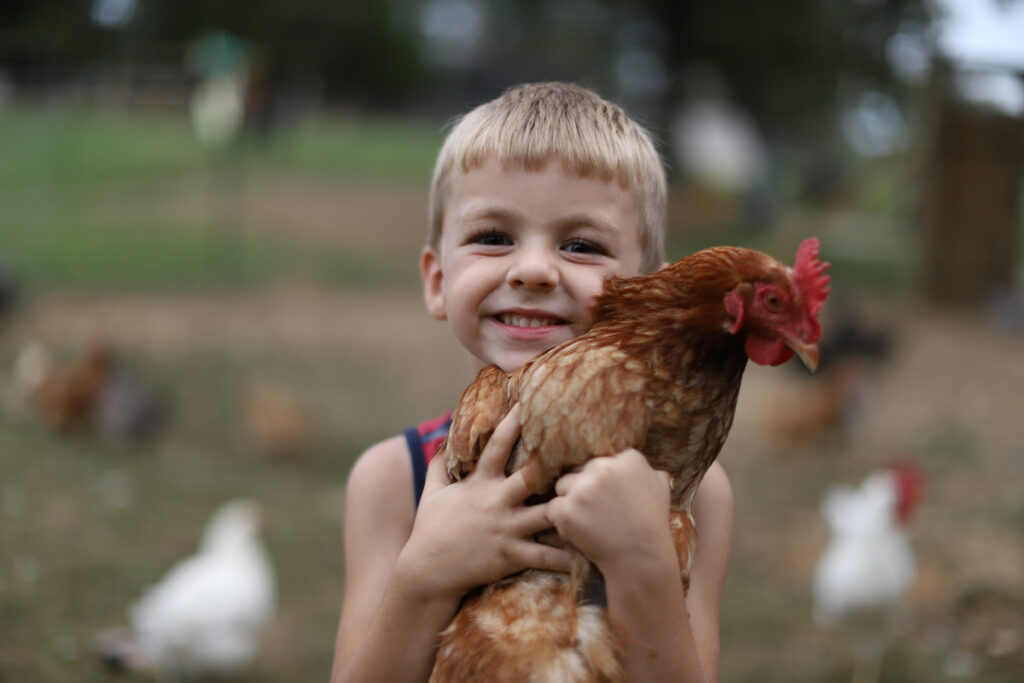
Raising Chickens is Easy
One of the main reasons that chickens are the gateway animal into homesteading is because they're easy. This can't be said about every animal, but it's definitely the case for chickens.
They have very few needs other than the following:
- Provide Shelter – Give your ladies a place out of the elements. There are many reasons why chickens will stop laying eggs, so be sure you're giving them the best chance.
- Protection – Protection is key. Make sure you have a secure coop where chickens are protected from neighborhood dogs and overhead predators. You also want a secure coop that will keep egg-theifs out as well.
- Roost – A place to roost is important. Chickens like to sleep up off the ground. Make sure it's a safe place inside their shelter where they're protected from nocturnal predators.
- Nesting Boxes – Chickens will lay their eggs anywhere, but if you don't want to do an Easter egg hunt every single day, give them a nice dry protected place to lay their eggs. Bonus if they're also easy to collect without disturbing the flock.
- Water – Chickens need access to clean water at all times. In fact, not having water is one reason your hens may slow down on laying. Even being out of water for 24 hours can affect their egg cycle. If you live in a region where the temperatures fluctuate, be sure their water doesn't freeze or get too hot as well.
- Food – Make sure you're well aware of
- To Free-Range or Not – We don't free-range our chickens because they will inevitably end up in the garden. My chickens are only allowed in at the end of the garden year when we want them to clean it up (but not if there are perennials I want to keep!).
- Alternative to Free-Range – A chicken run allows your hens some space to roam around on the grass while also keeping them contained. This doesn't have to be fancy, it can even be a dog kennel! We use moveable electric fencing to create a perimeter around our mobile chicken coop. This allows us to move the chickens as needed to fertilize the land and keep one area from getting decimated.
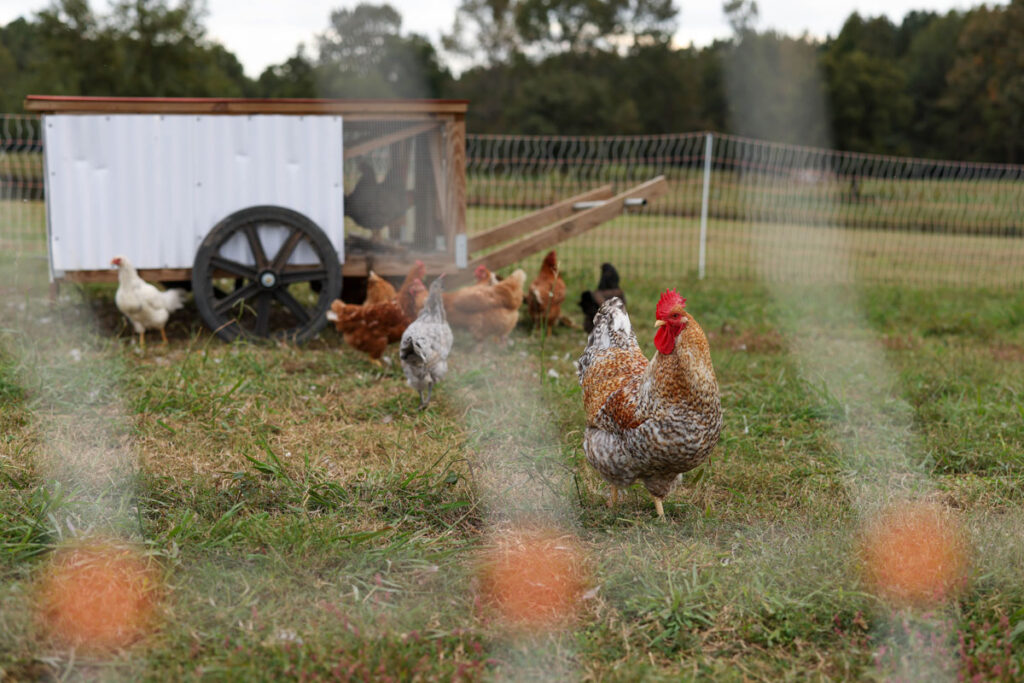
Shelter
Mobile Chicken Coop
As mentioned, we use a mobile chicken coop so we can move our flock around our property. We used Justin Rhodes ChickShaw design for one of our coops (with the addition of an automatic door), and an Etsy design for the other. We love that they have a wire floor so their poop drops straight down onto the grass.
Don't think you need a large flock to merit a mobile chicken coop. Even a small backyard flock of three chickens is good to have a mobile chicken coop.
Static Chicken Coop
I will say that if you live in a colder climate, a static coop with deep litter bedding may be the best option. This will help keep your hens warm and give them a more secure place to get out of the elements.
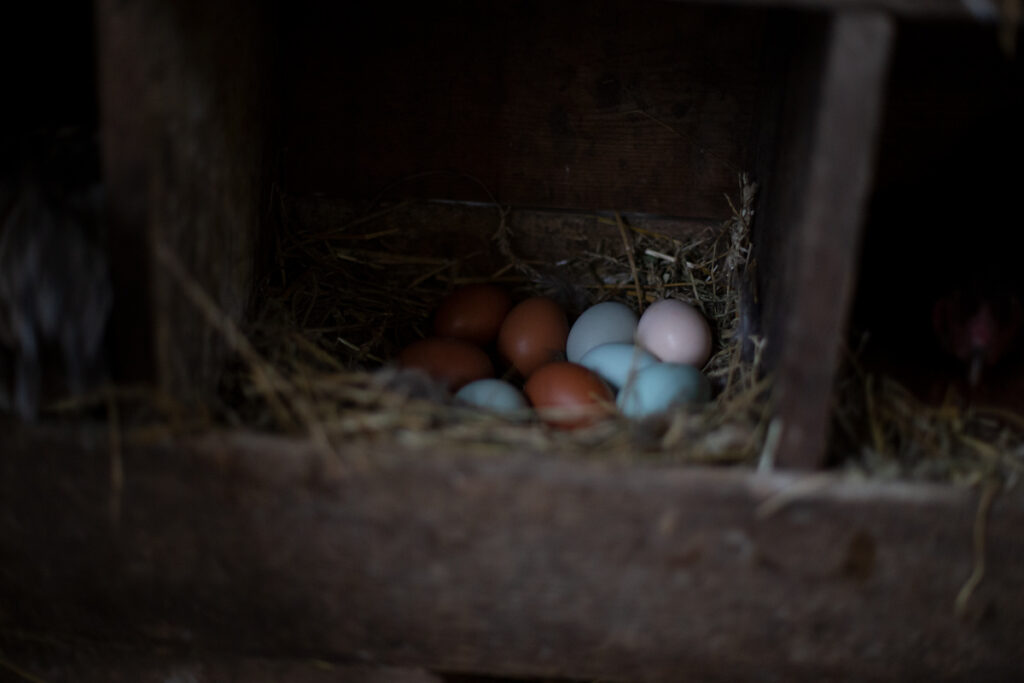
Protection
We like to surround our mobile coops with Gallagher Netting (or Premier 1 netting). This makes it easy to turn the fence on or off in order to climb over and collect the eggs. It's also very easy to move and you're not locked into having a fence in one area.
Space
When it comes to space, this is another area where opinions and information can vary greatly. What it boils down to is how you're going to keep your chickens.
For instance, inside our mobile coop our chickens don't have that much space at all. However, that coop door opens every morning and those birds have adequate space to peck and roam around. Therefore their coop doesn't need to be all that big just for them to roost and lay.
If there are ever days where you won't be letting your chickens out, then they'll need more space. Also, if you're using a static chicken coop that doesn't have much outdoor space for them to roam, the amount of space they'll need will increase.
A general rule of thumb:
- Each bird needs 3-4 square feet of living space.
- Each bird needs 10-12 inches of roosting space.
- If the birds will be confined in the coop then they'll need approximately 10 square feet per bird.
I've seen people do more than this and I've seen people do less than this.
Water
As I mentioned, chickens typically won't drink hot water. We like to use shallow bins or shallow troughs as waterers because we're refilling them daily here in the south.
Be aware that open troughs aren't a good idea if you have baby chicks because they may drown.
If you live where temperatures are dipping well below freezing, make sure you have some kind of warmer, or at least check on their water multiple times daily to ensure it hasn't frozen.
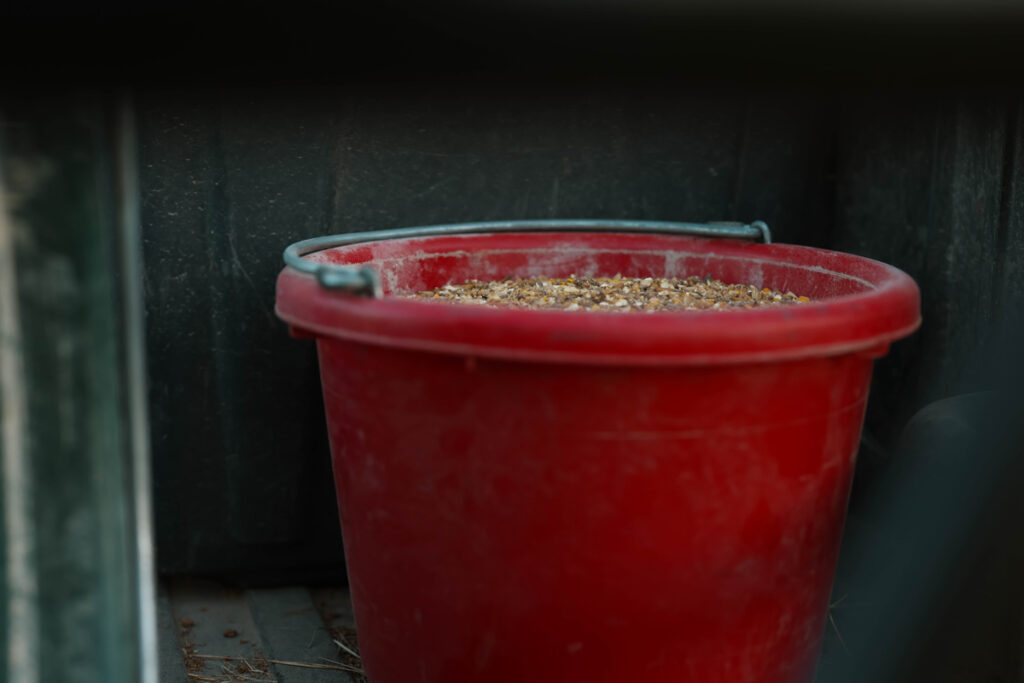
What to Feed Chickens
We use a non-GMO layer feed. However, we've fed our chickens multiple ways over the years, so this is by no means the only option.
We do recommend buying your feed locally. It'll likely be cheaper than the big box stores where feed is being mass-produced.
When it comes to feeding chickens, there are always people who argue about what to feed and what not to feed, or the different ratios, etc.
In my experience, chickens ideally need a diet with 12-20% protein. Each chicken needs 1/4-1/3 lb of food each day, total.
When calculating this total, you want to make sure that includes what you're feeding them in kitchen scraps, what they're getting in bugs on fresh grass, etc.
But having this estimate in mind will help you understand how much it's going to cost to feed your chickens, as well as help you know how much feed to have on hand depending on how often you want to be purchasing feed.
Keep in mind that scratch feed is more of a treat for your birds. Unfortunately, it's just not high enough in protein for rich-quality nutrient-dense eggs.
The beauty of chickens is that they'll tell you if they're getting enough nutrition/ food. Watch the feed on the ground. If there's food leftover at the end of the day, then you can probably scale back just a bit on how much you're feeding them.
If you find the ground is constantly bare, try scaling up the amount of feed until you know your chickens are getting all they need.
Fermented Chicken Feed
One way to save on costs is by fermenting your chicken feed. This increases the volume of the food and you'll end up feeding your chickens less overall.
Another option is foddering your feed, which means sprouting the grains. This does take a pretty extensive setup and you'll want to be sure to do this where rodents can't get to the feed. Fodder will help supplement your chickens diet if they can't free-range.
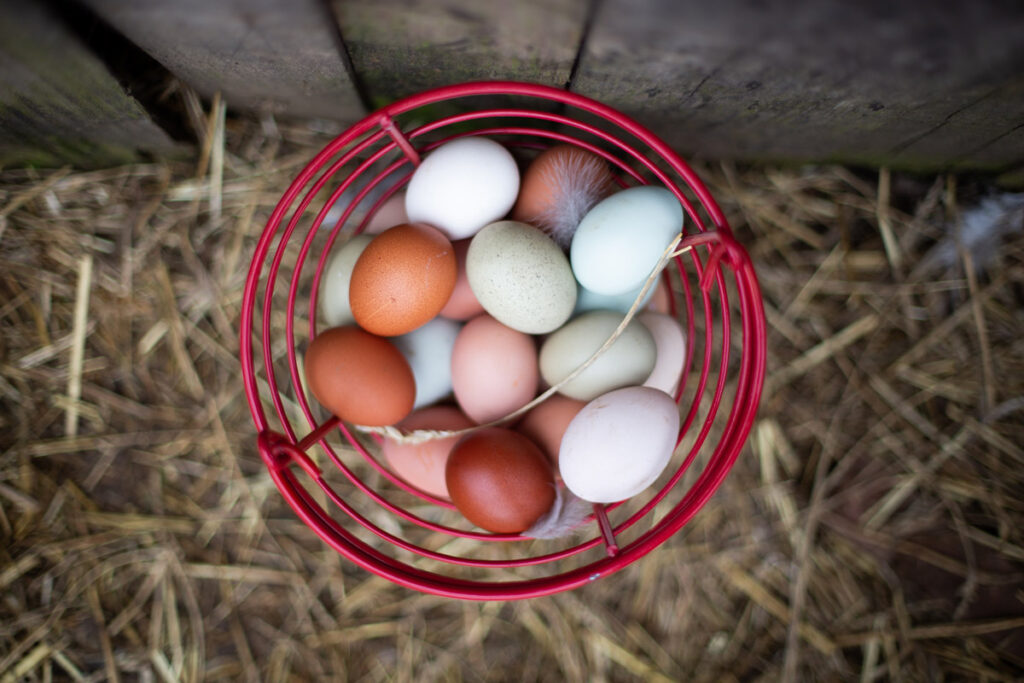
Supplements
How do you know if your chickens need supplements? Look at their shells. If they're brittle and crack super easy it may be time to add some calcium to their diet.
You can accomplish this multiple ways. The cheapest (though not the easiest) is to save eggshells and bake them until they're dry. Then crush this up (or blend it in a high-powered blender) and mix this crumble in with their feed to keep their calcium up.
To simplify this you could also give your chickens the egg shells whole, however, I don't do this because it could teach them to eat their own eggs. Then you have a bigger issue on your hands.
Alternatively, you can buy oyster shells and supplement your chicken's diet with that.
Dust Baths
Depending on where you live and the type of coop you're using, you may deal with mites and other pests on your chickens. The best way to combat this is with a dust bath.
Be sure your chickens have access to a place where they can roll in the dust. They actually coat their feathers in this and it helps rid them of mites. If mites are a real issue, you can consider mixing in some Diatomaceous Earth (DE) with their dust bath.
We haven't had issues with mites since we started free ranging with the mobile coop.
If your chickens stop laying, check them for mites by going out at night and looking at their vent with a flashlight. You may see mites there. Dust baths can help.
Molting
If you've heard of the term “molting,” this is when chickens lose their feathers and replace them with new ones.
It can look like your chickens aren't doing well or that their health is suffering, but it's completely normal. Add protein to their diet during this time because regrowing feathers takes a lot of energy for your hens.
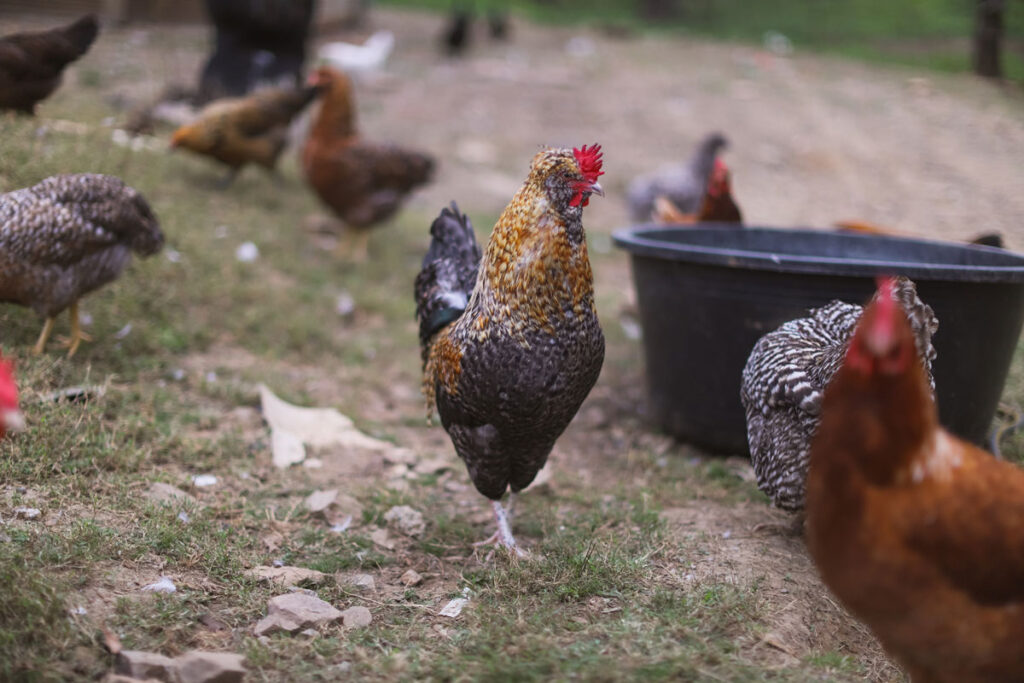
Do Chicks Need a Rooster to Lay Eggs?
No, hens will lay eggs no matter what. This is a common misconception that chickens won't lay unless there's a rooster. Chickens need a rooster in order to lay a fertilized egg (an egg that can grow into a chick). Most grocery store eggs you buy will be unfertilized.
If you've ever cracked open an egg and seen a tiny red spot, that's likely a fertilized egg.
Be aware that many city ordinances don't allow for roosters. Know your city rules and regulations before bringing a rooster home.
If you want chicks, one rooster can cover 8-10 hens. But be mindful of your flock that the roosters aren't causing damage to your ladies.
Mean roosters are real. Not all are mean, but some are. In our experience, if you respect them, they respect you. Also, heavier breeds seem more docile than lighter breeds.
In our 10 years of raising chickens, we've only made “mean rooster soup” three times. On our farm, it's three strikes and you're out.
We also teach our kids to respect the rooster and teach them that it's his job to protect his hens.
Breeds
As mentioned above, I have an entire blog post dedicated to chicken breeds and what breed is best for your situation.
One thing to keep in mind is whether you're raising chickens to have a sustainable flock (meaning you'll have a rooster and hatch out chicks each year), or whether you just want chickens to provide eggs for your family and you plan to purchase new chicks or pullets every few years.
If you're wanting to breed your chickens, the best bet will be to get a heritage breed. If you're not wanting to hatch out chicks, then the hybrid breeds will do just fine and you may get 2-3 more eggs per week from each bird.
The thing with hybrid breeds is that their “broodiness” characteristics have been bred out. This isn't true 100% of the time, but if your goal is to hatch out eggs, it's good to be aware that hybrid breeds may have this characteristic bred out.
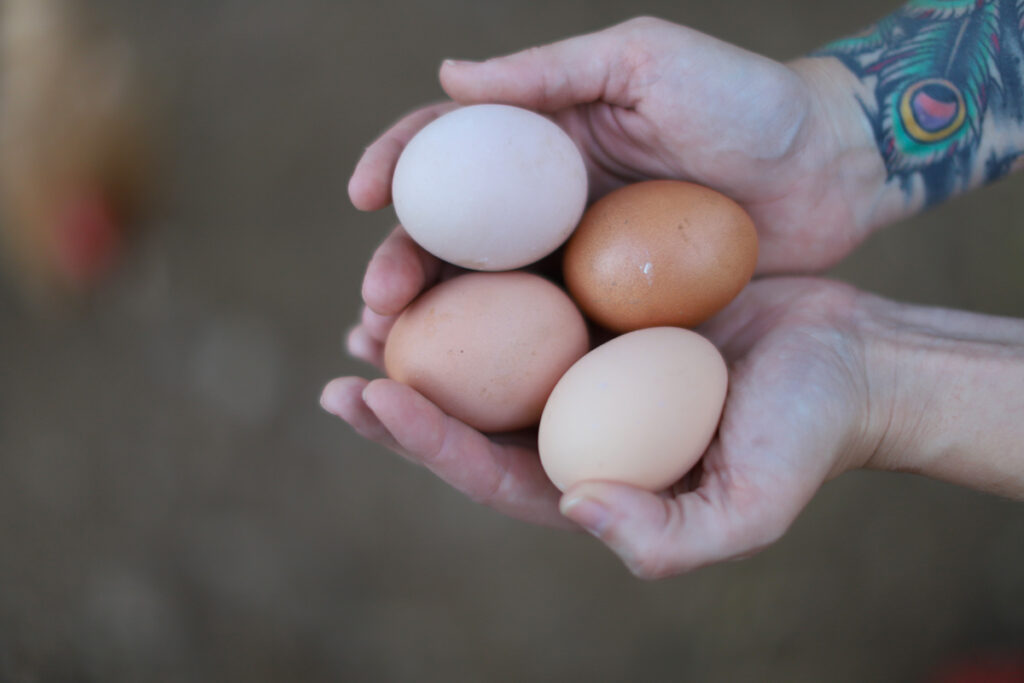
Are Backyard Chicken Eggs Better Than Store-Bought?
Typically speaking, yes. But not all farm-fresh eggs are superior to store-bought eggs. Likewise, brown eggs have no more nutritional value than white eggs. This is a common misconception because at the grocery store, brown eggs tend to cost more.
Your chickens need to be provided with a high-protein diet that comes from free-ranging on fresh grass with plenty of access to bugs. Otherwise, the free-range store-bought eggs will have darker, more nutrient-rich yolks than the homegrown eggs from chickens only fed commercial chicken feed.
The health of the egg is directly tied to the quality of the chicken's diet.
How Many Chickens Do I Need?
This is a common question and the answer will vary greatly depending on your needs. How many eggs does your family generally eat per week? If you had access to more eggs, would you consume more?
For us, our egg consumption has increased greatly as my boys have gotten older and my oldest son has gotten into weight lifting.
Considering that one bird will lay, on average, 4-5 eggs per week, this should help you make your decision. But also keep in mind that chickens will slow down (or in some climates stop completely) on egg production, you may want to adjust this.
In South Carolina, our chickens continued laying throughout the winter and we never had to supplement with store-bought eggs. Some people increase the number of chickens they have to account for this decline in egg production and then either sell the surplus or preserve the extra eggs for the winter.

Want to Learn More?
If you're looking for more information, there's a chapter in my book, The First Time Homesteader all about raising chickens. I also would recommend the book The Homesteader's Natural Chicken Keeping Handbook: Raising a Healthy Flock from Start to Finish by Amy Fewell.
To conclude this blog post I want to encourage you to raise chickens that bring you joy. There are so many kinds of chicken breeds, some with plumes of hair on their heads, some that look like a ball of feathers, etc. If looking at a cute ball of fluff brings you joy and you'll also get eggs out of it, then do it!
But do let your “why” be the driving decision-maker of your choices. Hopefully this blog post has helped direct you and give you clarity on what raising chickens looks like, including the resources needed to be prepared.
